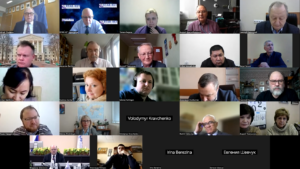The IX General Assembly of the Regional Network for Education and Training in Nuclear Technology – STAR-NET was held on January 23, 2024. 32 representatives of 11 universities-members from Armenia, Belarus, Kazakhstan, Poland, Russia, Uzbekistan, Ukraine, and the IAEA took part in the event summing up the results of eight years of the network’s work and identifying further areas of cooperation in the field of nuclear education.
 The Deputy Director General of the IAEA, Head of the Department of Nuclear Energy, Mikhail Chudakov addressed the participants with a welcoming speech. He pointed out that for the long-term development of highly qualified nuclear professionals, university education programmes in nuclear technology and management are vital. These programmes are becoming increasingly international in the form of network education through regional and interregional cooperation. Mikhail Chudakov noted the multifaceted cooperation between STAR-NET and the IAEA – “we work together on the NKM Digital Hubm the International Nuclear Management Academy (INMA), learning management systems and a full range of knowledge management and nuclear education activities.” Mikhail Chudakov proposed to hold the X STAR-NET General Assembly in Vienna.
The Deputy Director General of the IAEA, Head of the Department of Nuclear Energy, Mikhail Chudakov addressed the participants with a welcoming speech. He pointed out that for the long-term development of highly qualified nuclear professionals, university education programmes in nuclear technology and management are vital. These programmes are becoming increasingly international in the form of network education through regional and interregional cooperation. Mikhail Chudakov noted the multifaceted cooperation between STAR-NET and the IAEA – “we work together on the NKM Digital Hubm the International Nuclear Management Academy (INMA), learning management systems and a full range of knowledge management and nuclear education activities.” Mikhail Chudakov proposed to hold the X STAR-NET General Assembly in Vienna.
Vladimir Shevchenko, President of STAR-NET, Rector of the National Research Nuclear University MEPhI, noted in his speech that the creation of networks of educational institutions and universities is a key element of the strategy to increase higher education opportunities and the effective use of existing resources. Educational networks facilitate the exchange of information and best practices between their members, ensure the reproduction of practices in certain areas, and provide students with the opportunity to receive information from the best teachers and experts in special subjects. The key factors for the success of educational networks are the deep integration and interaction of educational institutions, on the one hand, and nuclear industry facilities, on the other. Vladimir Shevchenko informed participants about the creation of the International Scientific and Educational Center for Nuclear and Related Technologies “Obninsk.Tech” and expressed confidence that the STAR-NET universities will play the active role in its implementation.
Helena Zhivitskaya from the IAEA Nuclear Knowledge Management Section presented the IAEA’s initiatives in the field of nuclear knowledge management and nuclear education. She noted that the STAR-NET network effectively cooperates with the IAEA, complementing existing international initiatives and focusing on education and training of specialists and pays great attention to issues related to the use of safe nuclear technologies for sustainable development.
Andrey Tymoshchenko, Vice President of the network, and Andrey Kosilov, Executive Director, spoke about the main events and projects implemented within the framework of the STAR-NET network. It was noted that the STAR-NET Learning Management System plays an important role in organizing cooperation and implementing common educational tasks. The platform is supported and managed by the STAR-NET network and currently has more than 1,800 users. Partnerships between universities are developing – internships for teachers and students, joint events. The distance learning course “International Nuclear Cooperation. Technical aspects” continues to work, it has been attended by more than 350 students from 9 universities since 2018. In September 2023, a new cooperation agreement was signed between the IAEA and STAR-NET, and since 2023, STAR-NET has been an observer in the IAEA/INPRO project. The IAEA’s Model Curriculum on Strategic Planning of Sustainable Nuclear Energy was developed with the participation of STAR-NET experts. STAR-NET representatives participated in nuclear education events during the IAEA General Conference and other meetings.
The thematic groups team-leaders and university representatives discussed the experience gained by universities in solving the problems of education and professional training of specialists for the nuclear industry. Many universities have established cooperation with leading enterprises that involved in this work, international exchange of students and teachers, and the preparation of textbooks related to education in the field of nuclear technology. The participants supported the development of the STAR-NET Provision on public certification of basic professional educational programmes and programmes of professional development and suggested to finalize it and conduct a pilot certification in 2024.
The participants elected the governing bodies of STAR-NET.
Based on the results of discussions of the submitted proposals, the participants approved the main areas of work in 2024, which include expanding cooperation with the IAEA and other international organizations involved in nuclear education, developing ties between member universities, regular webinars on topical issues of nuclear technology, and further development of the educational infrastructure of the network.